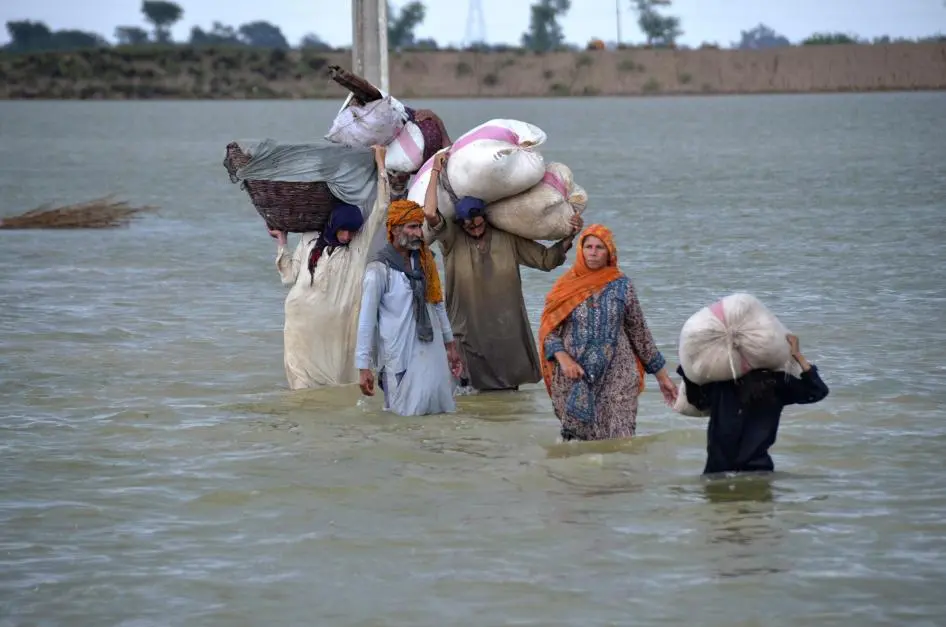Dr Bilawal kamran
The devastation unleashed by the floods across Punjab, with Sindh bracing for similar destruction, is nothing short of catastrophic. Pakistan’s agricultural heartland has been inundated, wiping out crops on thousands of acres and plunging the nation into an unfolding crisis. The deluge has sparked urgent calls for an agricultural emergency, as food security, rural livelihoods, and fiscal stability all stand on the brink.
While official assessments of the damage are still awaited, preliminary evaluations from the Pakistan Business Forum (PBF) paint a grim picture. According to the forum, nearly 60 percent of the rice crop, 35 percent of cotton, and 30 percent of sugarcane across central and southern Punjab have been destroyed. These figures underscore the sheer scale of destruction to crops that not only feed the nation but also sustain the economy through exports. The PBF has written to the Prime Minister, urging the government to declare an agricultural emergency, stressing that “such destruction in Punjab due to flooding has never been witnessed before.” The warning is clear: if preventive measures are not immediately enacted, Sindh is set to experience the same fate.
Follow Republic Policy on YouTube
This call for urgent action comes at a critical time. Pakistan is already reeling under an economic crunch, with food inflation soaring and fiscal imbalances widening. The floods have not only destroyed crops in the fields but also washed away large reserves of wheat stored in homes and warehouses. These losses strike at the core of national food security, threatening to leave tens of millions of rural and urban households vulnerable to hunger and economic distress. The agricultural emergency is not merely a demand—it is an existential necessity.
Follow Republic Policy on Twitter
The Finance Ministry has also issued a stark warning. In its monthly report, it predicted that flood-related damage would exacerbate fiscal pressures, with losses in food and industrial crops likely necessitating costly imports. Pakistan, already struggling to balance its external accounts, may find itself forced to import wheat, rice, or cotton to fill the gap—placing further pressure on foreign exchange reserves and deepening the fiscal deficit.
Follow Republic Policy on Facebook
Even before the recent floods, Pakistan’s agricultural sector was in troubled waters. Agriculture, which accounts for nearly a quarter of GDP and employs almost 40 percent of the labour force, had been showing signs of decline. In the last fiscal year, the sector grew by only 0.56 percent, the lowest in nearly a decade, compared to the five-year average of 3.38 percent. This sluggish performance dragged down overall GDP growth and hit industrial and services sectors dependent on agricultural outputs. The failure to meet growth targets last year is now being compounded by the devastation of the floods, ensuring that agriculture’s contribution this fiscal year will again fall drastically short.
Follow Republic Policy on TikTok
Declaring an agricultural emergency is the first essential step, but it cannot be the last. The present crisis should serve as a wake-up call for Pakistan to rethink its agricultural strategies. For decades, the farm sector has been neglected, underinvested, and left vulnerable to climate shocks. Poor infrastructure, inadequate water management, outdated cropping patterns, and lack of support for small farmers have all contributed to systemic weaknesses. Now, climate change is amplifying these vulnerabilities, with more frequent and destructive monsoon floods wreaking havoc year after year.
Follow Republic Policy on Instagram
The solution lies in a two-pronged approach: short-term relief and long-term reform. In the immediate term, the government must mobilize resources to support farmers—through compensation for crop losses, provision of seeds and fertilizers for replanting, and investment in rehabilitation of damaged farmlands. Relief must also extend to rural households who have lost not only crops but also livestock, homes, and means of livelihood. In the longer term, structural reforms are indispensable. Pakistan needs modern irrigation systems, climate-resilient seeds, stronger crop insurance schemes, and policies that prioritize agricultural innovation and food security over short-term gains.
Follow Republic Policy on WhatsApp
This is not simply a story of damaged fields; it is a story of national survival. Without decisive intervention, the destruction of crops will cascade into food shortages, higher inflation, unemployment, and social unrest. Agriculture is the backbone of Pakistan’s economy, and when that backbone is broken, the entire structure wobbles. The floods have exposed once again the fragility of Pakistan’s farm sector and the dangers of complacency.
The tragedy must be transformed into an opportunity. Declaring an agricultural emergency and moving beyond lip service toward genuine reform could lay the foundation for a more resilient agricultural system. If the government fails to act decisively now, the costs will multiply—not just in rupees but in human suffering. The floods may have come from the rivers, but the real disaster would be the state’s failure to learn, reform, and protect the nation’s food future.
















